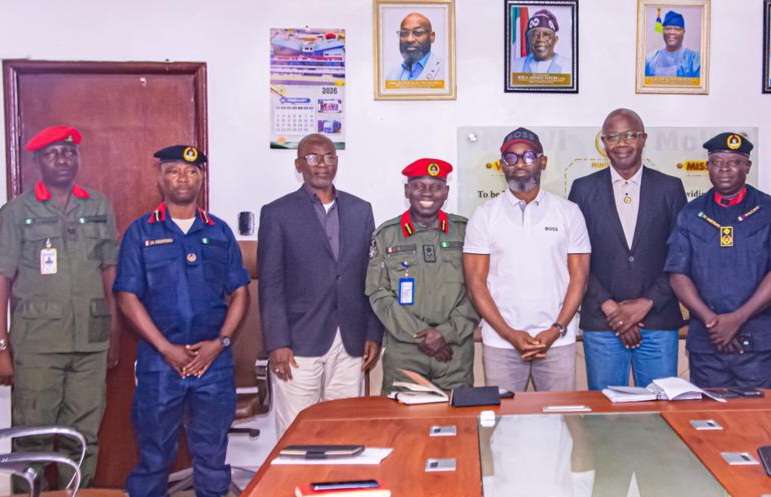
Pix: John Onoja Attah, Commander of the NSCDC’s Special Mining Marshals
By Isiaka Mustapha, CEO/Editor-in-Chief, People’s Security Monitor
As Nigeria intensifies efforts to fight illegal mining and safeguard its mineral resources, the Nigeria Security and Civil Defence Corps (NSCDC), particularly its Special Mining Marshals has emerged as a vital instrument in the fight. These operatives are strategically deployed across the country’s mining fields not only protect mineral assets but to also serve as stabilizing agents in regions frequently plagued by exploitation, violence, and environmental degradation.
Yet, despite their legal backing and operational significance, the Special Mining Marshals are often hindered by a longstanding and deeply rooted challenge: rivalry among government security and regulatory agencies.
In an already overstretched security framework, the lack of synergy among agencies has only deepened the vulnerabilities in Nigeria’s mining landscape. Overlapping functions, competition for control, and institutional turf wars between the NSCDC, the police, the military, and other stakeholders have become commonplace. Rather than collaborating toward a unified goal, these agencies frequently operate at cross purposes thus creating confusion on the ground, duplicating efforts, and squandering limited resources. This fragmented approach undermines the national response to illegal mining, which poses not just an economic threat but a serious national security concern.
The NSCDC’s involvement in mining site security is firmly anchored in Nigerian law. Established under Act No. 2 of 2003 and later amended by Act No. 6 of 2007, the Corps is specifically mandated by Section 3(1)(f) to protect critical national infrastructure, including mining operations. The deployment of Special Mining Marshals is therefore not a matter of administrative convenience rather it is a legal, strategic, and necessary extension of this statutory responsibility.
What distinguishes the NSCDC from other security outfits is its unique community-based orientation. Unlike conventional forces that often operate from a distance, the Corps has built its operations around grassroots engagement. This model enables it to gather actionable local intelligence, foster trust among host communities, and maintain a visible presence in areas where illegal mining is often entrenched and backed by powerful interests, including armed syndicates.
The Special Mining Marshals are trained not only to secure mining fields but also to actively engage with local populations. This dual capacity allows them to navigate the complex socio-economic terrain of rural communities where resistance to state authority is sometimes high and to proactively identify threats before they escalate.
Despite this distinctive advantage, internal rivalries between agencies continue to impede progress. Battles over operational jurisdiction have resulted in duplicated surveillance, disjointed raids, and unnecessary confrontations in the field. These institutional frictions delay crucial responses, reduce operational efficiency, and create exploitable loopholes for illegal mining cartels.
Rather than perceiving the Special Mining Marshals as competitors, other security and regulatory institutions should recognize them as essential partners in a collective national effort. A well-coordinated framework where each agency’s strengths are clearly defined and harmonized can significantly improve the country’s capacity to tackle illegal mining. The NSCDC is well-suited for intelligence gathering and community liaison, while the police and military can offer backup in high-risk or heavily armed zones.
Through structured joint task forces, inter-agency coordination meetings, and transparent operational roles, Nigeria’s mining security architecture can transition from its current fragmented state to a more unified and responsive force.
Illegal mining presents a complex threat that transcends resource theft. It finances insurgent activities, destabilizes rural economies, erodes environmental integrity, and drains public revenue. In addressing this multifaceted crisis, intelligence gathering is just as important as physical presence. The NSCDC’s community-first approach enables it to identify early warning signs and swiftly initiate countermeasures capabilities that are often missing in more hierarchical, force-driven institutions.
There is now an urgent need for policy harmonization. The federal and state governments alongside the Ministries of Mines, Interior, and Defence must develop a coherent framework that places the NSCDC in a central role for field surveillance and community intelligence. By clearly defining support roles for other agencies and creating an integrated command structure, the recurring operational tensions can be resolved and replaced with true inter-agency synergy.
Nigeria cannot afford to let bureaucratic rivalries derail its efforts to secure its mineral wealth. The Special Mining Marshals are not acting outside their mandate they are serving a critical national purpose. It is time to move away from siloed operations and embrace a collaborative approach. Empowering and supporting the NSCDC is not merely beneficial; it is essential for building a safer mining environment and a more secure, economically viable Nigeria.






